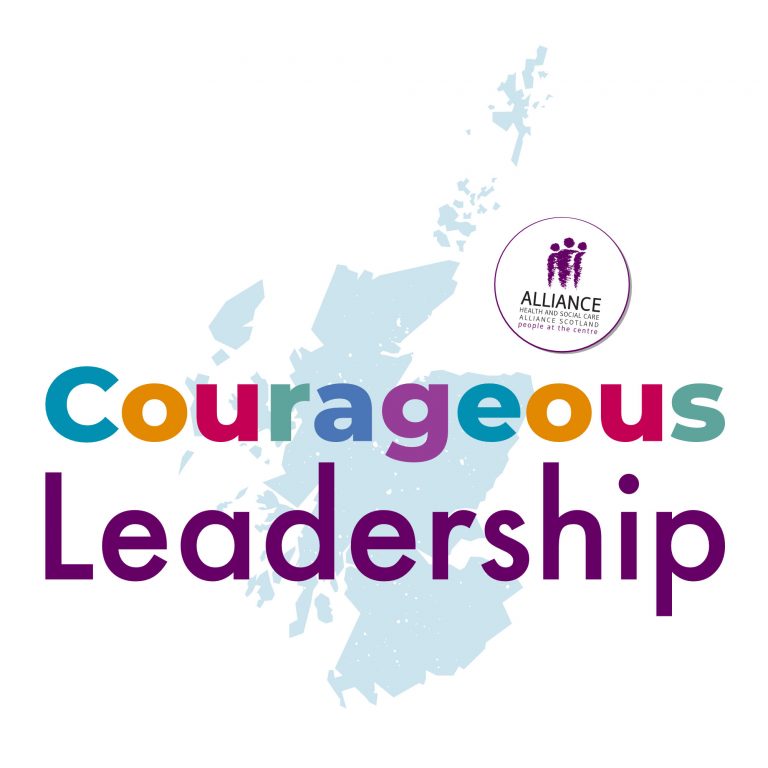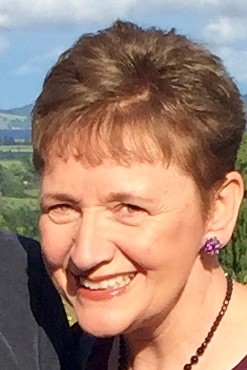Courageous Leadership – Pat Graham, PAMIS
- Written by: Pat Graham — PAMIS — Chair
- Published: 7th May 2021

Pat Graham, Chair of 'Promoting a more inclusive society', shares her thoughts on Courageous Leadership.
PAMIS have supported people with profound and multiple learning disabilities, as well as their families, in Scotland since 1992.
What does courageous leadership mean to you?
I have to confess that the concept of “courageous” leadership had never previously occurred to me but I do admit to having learnt a thing or two about courage over the years. What my wonderful daughter who has a profound and multiple learning disability (PMLD) hasn’t taught me about courage isn’t worth knowing. What I’ve discovered is that she and her peers are the most heroic and indomitable people in our society. They cope with inconceivable hurdles throughout their lives and yet do so with a dignity and fortitude that the rest of us would struggle to emulate.
I’ve encountered a broad spectrum of leaders and on reflection I think that what distinguishes the best from the rest, is how courageous they were. The leader who stands above all the others I’ve had the pleasure of working with has also been inspired by people with learning disabilities, and in my view is the embodiment of courageous leadership. Jenny Miller is the Chief Executive of PAMIS, a charity which champions people with PMLD. She has steered our small charity through some truly arduous times and with energy, enthusiasm, imagination, perseverance and determination and has ensured that PAMIS has effected meaningful and significant long term benefits for people with PMLD and their families.
What attributes of courageous leadership are important to you in your role?
This is a really thought-provoking question, to which I have given much thought. One website identifies the key characteristics of courageous leadership as authenticity, resilience, emotional intelligence, self-discipline and commitment to purpose. These are certainly qualities that I would always aspire to, but I would like to add some of my own to this list, including thoughtfulness and imagination. PAMIS has a very proud history of consulting with and involving people with PMLD and their families and carers in everything that we do. Many people with PMLD are non-verbal and so can find it a challenge to articulate their thoughts and feelings, but their families are incredibly adept at doing so. This has enabled us to harness the ideas and imagination of family carers to innovate and to trailblaze. To do this effectively, it is essential to listen to the exceptional colleagues in our PAMIS team who because of their close relationships with families ensure that as an organisation we are focussed on the most rewarding outcomes. Finally, I would add perseverance and tenacity to the list. PMLD families are an invisible group, often without a voice and I believe that it is my role, wherever and whenever I can, to ensure that they are seen and heard.
Is authenticity important to you and how do you bring it to your position?
I guess like so many other people in leadership or management roles, I’m a victim of imposter syndrome. On the day I retired, as I was walking out of the door clutching my gifts, my mug and my good pen (and ok I confess, a stapler), I was chuckling to myself and thinking with relief that I’d made it through 40 years without being found out. In my career, I was performing a role that was very much ‘other’ than myself, although that was helpful in the sense of retaining an identity that went beyond being defined as a family carer. I always tried to bring something of my own approach and values to my role and in the early years of my career this could be a challenge as in those days it was very much a male dominated environment. However my involvement with PAMIS, is very much about being myself. I may have skills and attributes resulting from my time as a civil servant, but at PAMIS I am most valued for my expertise, experience and the feelings that I have as a family carer. I very much feel an integral part of the PAMIS family which makes it so much easier to be my authentic self.
Throughout your journey what, or who, has been influential in shaping your leadership style?
During most of my long career in HMRC, I was a senior tax inspector. The times that stand out for me as the most enjoyable and productive were when I was either a member of a team or a team leader. I really enjoyed collaborating closely with colleagues on projects that had finite outcomes, where you could see the benefits of a positive result. The results weren’t always positive, but I loved the challenge of puzzling out how to collaborate to make it work. My greatest challenge was introducing the concept of quality management to hardened tax inspectors. We did have some success, but no one will be surprised to know that was a pretty tough gig! As a leader you have to be confident that you have the skills and attributes to motivate others to give of their best, and acquiring that confidence can be daunting. I was lucky early in my career to have a boss who told me on many occasions that I could achieve much more than I’d ever imagined I could, then helped me to acquire those skills. This is a lesson that has served me well and I have always tried to replicate that approach and philosophy.
In your opinion what, in terms of leadership, is required for the future of health and social care in Scotland?
Good leaders have a clear strategy. They collaborate and they communicate well. They motivate colleagues and inspire them to be innovative and imaginative and perform to the best of their ability. Unfortunately this has not always been my personal experience of health and social care in Scotland. I have encountered wonderful, talented and supportive individuals but at an organisational level I have found much to be improved upon. I understand the financial constraints of recent years but find that these may be used as an excuse for not thinking creatively about how to resolve problems, resulting in a culture of inflexibility and intransigence. I have read the legislation, the guidelines, the strategies, the visions and mission statements. There is much to praise and be proud of, but what seems to be lacking are the actions that support these praiseworthy documents. If, as an individual, you aspire to activate these stated objectives then the process available to you feels byzantine and will discourage all but the hardiest of complainants. If I could have the health and social care of my dreams, it would be honest, transparent, consultative, dynamic, empathetic, genuinely aware of human rights and “Health” and “Care” would communicate effectively with each other to bring about changes for the better.
End of page.
You may also like:
‘This is such a beautiful way to bring in an element that's vital to someone's happiness.’ Professional Care Partner.
Continue readingA lived experience perspective is needed to develop services and amplify the voices of unpaid carers of all ages in Highland.
Continue readingKelly Muir reflects on the barriers for people with no recourse to public funds when accessing the right to health.
Continue readingSelf Management Programme Manager Grace reflects on the fifteenth anniversary of Gaun Yersel, the Self Management Strategy for Scotland.
Continue readingAutomated reminder emails to users have started, following the most recent technical improvements to ALISS.
Continue readingFor many the nightmare of Long Covid is something they live with every day.
Continue readingPromoting rights awareness through accessible information and the voice of lived experience.
Continue readingThe third sector’s economic contribution and development seems to be too often overlooked.
Continue readingDigital Assistant Director, Chris Mackie reflects how the lack of an appropriate sticker led to the destruction of medical records.
Continue reading"Because no one put a sticker on them."
Continue readingWhy it matters to you to participate in the public consultation on 'A draft outline Charter of Rights for People Affected by Substance Use'.
Continue readingDr Tony Robertson reflects on how we make the right to health a reality for everyone.
Continue readingOver 12 million people live with Congenital Heart Disease globally with a population of 20,000 in Scotland.
Continue readingRory Chapman (Development Officer) reflects on the What Matters to You National Networking Event
Continue readingGiving unique insights into individual's lives, experiences, needs, and sense of character.
Continue readingReflections on a Self Management Reflective Practice (SMRP) session, from a Chest Heart & Stroke Scotland Advice and Support Practitioner.
Continue readingLucy highlights some ALLIANCE human rights activity from this year and to mark Human Rights Day 2023.
Continue readingChief Executive of Scottish Care, Donald Macaskill, critically reflects on the Winter Preparedness Plan.
Continue readingCalum reflects on the Community Partnership Conference 2023 in Inverness, which was built on trusting relationships and partnership working.
Continue readingSelf Management Network Scotland members Foundation for Positive Mental Health on how their free app can help with workforce wellbeing.
Continue readingHannah Tweed asks, “what next?” and calls for action from Scottish Government on the findings of the National Audiology Review.
Continue reading"Modern football clubs have a responsibility to engage with and take care of the communities they represent".
Continue readingMark Ballard outlines writes that it is time for the Scottish Government to act on the National Audiology Review
Continue readingCalum reflects on the Design HOPES launch event and the value that the third sector can add to the potentially world-leading project.
Continue readingSenior Development Officer for the Children and Young People Programme reflects on the current nature of funding in the sector.
Continue reading
